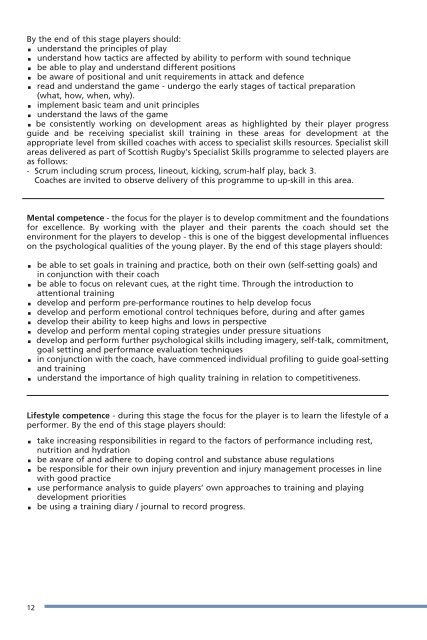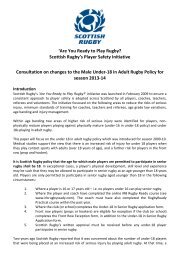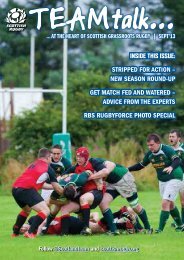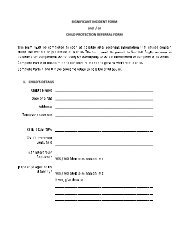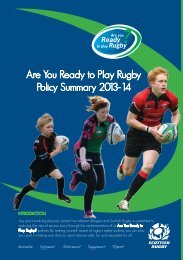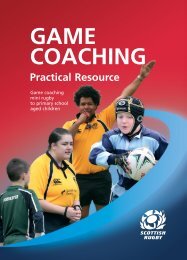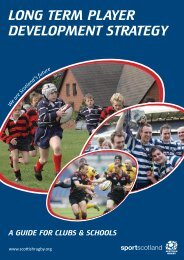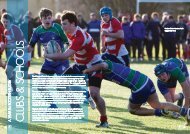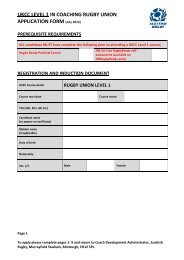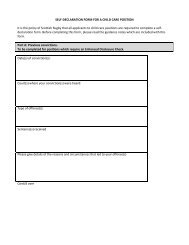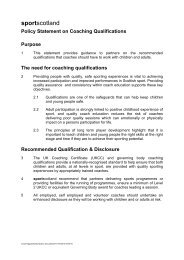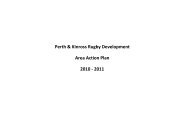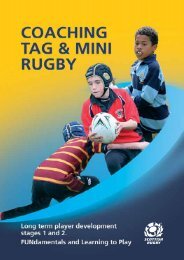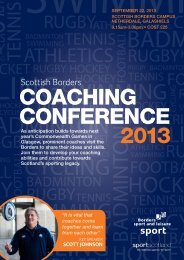LTPDst3cover.qxd (Page 1) - Scottish Rugby Union
LTPDst3cover.qxd (Page 1) - Scottish Rugby Union
LTPDst3cover.qxd (Page 1) - Scottish Rugby Union
- No tags were found...
Create successful ePaper yourself
Turn your PDF publications into a flip-book with our unique Google optimized e-Paper software.
By the end of this stage players should:understand the principles of playunderstand how tactics are affected by ability to perform with sound techniquebe able to play and understand different positionsbe aware of positional and unit requirements in attack and defence. read and understand the game - undergo the early stages of tactical preparation(what, how, when, why).implement basic team and unit principlesunderstand the laws of the game. be consistently working on development areas as highlighted by their player progressguide and be receiving specialist skill training in these areas for development at theappropriate level from skilled coaches with access to specialist skills resources. Specialist skillareas delivered as part of <strong>Scottish</strong> <strong>Rugby</strong>’s Specialist Skills programme to selected players areas follows:- Scrum including scrum process, lineout, kicking, scrum-half play, back 3.Coaches are invited to observe delivery of this programme to up-skill in this area.Mental competence - the focus for the player is to develop commitment and the foundationsfor excellence. By working with the player and their parents the coach should set theenvironment for the players to develop - this is one of the biggest developmental influenceson the psychological qualities of the young player. By the end of this stage players should:. be able to set goals in training and practice, both on their own (self-setting goals) andin conjunction with their coach. be able to focus on relevant cues, at the right time. Through the introduction toattentional trainingdevelop and perform pre-performance routines to help develop focusdevelop and perform emotional control techniques before, during and after gamesdevelop their ability to keep highs and lows in perspectivedevelop and perform mental coping strategies under pressure situations. develop and perform further psychological skills including imagery, self-talk, commitment,goal setting and performance evaluation techniques. in conjunction with the coach, have commenced individual profiling to guide goal-settingand training. understand the importance of high quality training in relation to competitiveness.Lifestyle competence - during this stage the focus for the player is to learn the lifestyle of aperformer. By the end of this stage players should:. take increasing responsibilities in regard to the factors of performance including rest,nutrition and hydration. be aware of and adhere to doping control and substance abuse regulations. be responsible for their own injury prevention and injury management processes in linewith good practice. use performance analysis to guide players’ own approaches to training and playingdevelopment priorities. be using a training diary / journal to record progress.12


